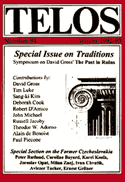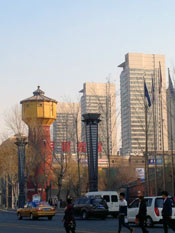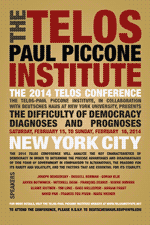By Jacob Dreyer · Thursday, May 29, 2014  In China as in the Soviet Union, it seemed particularly cruel to “political” prisoners that thieves, rapists, and murderers should be placed higher in the camp hierarchy than they were. From the perspective of the CCP, this often touched on the point of class origins, for of course the intellectual class often emerged from the urban bourgeoisie, whereas the common criminals come from the dodgy, poor neighborhoods or, in their rural equivalent, poor, burned-out villages. However, what the victorious revolutionaries sought to achieve was the laborious process of lifting the world off of its axle and inverting it, like a gigantic bureau drawer; of course all sorts of things fall out, and if they are delicate, shatter. The intellectual class was, and is, that class which had already begun lifting themselves out of the material world, on their own terms, with thought. For those authorities who wish to arrange a collective transfer of all resources and persons from the old world into a still unimaginable new one, this individualistic secession from the world is a most dangerous form of treason, in comparison to which the rapes, knifings, stolen bread, and liquor of the underclass are all too easy to forgive. For the latter are simply operating the system in their own disadvantaged way, with the same objectives, finally, as the capitalists and lords, whereas the thinkers seek to float away entirely. It is for this reason that in the camps, the political prisons were considered “external contradictions,” the criminals, “internal contradictions.” In China as in the Soviet Union, it seemed particularly cruel to “political” prisoners that thieves, rapists, and murderers should be placed higher in the camp hierarchy than they were. From the perspective of the CCP, this often touched on the point of class origins, for of course the intellectual class often emerged from the urban bourgeoisie, whereas the common criminals come from the dodgy, poor neighborhoods or, in their rural equivalent, poor, burned-out villages. However, what the victorious revolutionaries sought to achieve was the laborious process of lifting the world off of its axle and inverting it, like a gigantic bureau drawer; of course all sorts of things fall out, and if they are delicate, shatter. The intellectual class was, and is, that class which had already begun lifting themselves out of the material world, on their own terms, with thought. For those authorities who wish to arrange a collective transfer of all resources and persons from the old world into a still unimaginable new one, this individualistic secession from the world is a most dangerous form of treason, in comparison to which the rapes, knifings, stolen bread, and liquor of the underclass are all too easy to forgive. For the latter are simply operating the system in their own disadvantaged way, with the same objectives, finally, as the capitalists and lords, whereas the thinkers seek to float away entirely. It is for this reason that in the camps, the political prisons were considered “external contradictions,” the criminals, “internal contradictions.”
Continue reading →
By Telos Press · Wednesday, May 28, 2014 Just a reminder that the deadline for abstract submissions for this year’s Telos in Europe conference has been extended until June 15. If you plan to submit your paper for the conference, please be sure to email your abstract (no more than 250 words) to laquila@telosinstitute.net by that date, and place “L’Aquila 2014 conference” in the email’s subject line. For complete details about the conference, as well as the full call for papers, visit the conference page on the Telos-Paul Piccone Institute website.
Continue reading →
By Telos Press · Thursday, May 22, 2014 Telos Press is pleased to announce the 2014 Telos student essay competition, inviting graduate students and post-graduate researchers in the humanities to tell the world about their work. The competition offers young scholars the opportunity to be published in one of the leading international interdisciplinary journals. The deadline for submissions is August 1, 2014. For complete information about submitting your paper, click here.
Continue reading →
By Aaron Bell · Tuesday, May 20, 2014  It is hard to imagine what Adorno’s corpus would look like without the deep scars left by his period of exile in the United States during the Second World War. Despite its catastrophic genesis, his exile played a constitutive role in the development of his thought, and made him, among many other things, a savagely insightful commentator on American life. This commentary on America is marked by a dialectic of fascination and disgust with his newfound home, perhaps the most “radically bourgeois country” (75) in the Western world. In particular, he was fascinated by America’s lack of cultural tradition. In his essay “On Tradition,” America serves as a model of a society ravaged by bourgeois rationalization, proudly celebrating its lack of tradition by rejecting “old world” values as archaic, irrational, and pompous. The relatively short history of the nation compounds the problem, further disconnecting us from any substantial sense of tradition or historical consciousness. We are proudly the country of the nouveau riche, possessed of power and wealth bereft of tradition and culture. This literal lack of history and evaluative rejection of tradition places America at ground zero of the crisis of tradition. Tradition survives in America in its most degraded and mutilated forms, manufactured in artificially aged consumer products and conservative “traditional” family values. The recent wave of gauche typographical décor emblazoned with the actual word “TRADITION” seems designed to confirm Adorno’s worst accusations. It is hard to imagine what Adorno’s corpus would look like without the deep scars left by his period of exile in the United States during the Second World War. Despite its catastrophic genesis, his exile played a constitutive role in the development of his thought, and made him, among many other things, a savagely insightful commentator on American life. This commentary on America is marked by a dialectic of fascination and disgust with his newfound home, perhaps the most “radically bourgeois country” (75) in the Western world. In particular, he was fascinated by America’s lack of cultural tradition. In his essay “On Tradition,” America serves as a model of a society ravaged by bourgeois rationalization, proudly celebrating its lack of tradition by rejecting “old world” values as archaic, irrational, and pompous. The relatively short history of the nation compounds the problem, further disconnecting us from any substantial sense of tradition or historical consciousness. We are proudly the country of the nouveau riche, possessed of power and wealth bereft of tradition and culture. This literal lack of history and evaluative rejection of tradition places America at ground zero of the crisis of tradition. Tradition survives in America in its most degraded and mutilated forms, manufactured in artificially aged consumer products and conservative “traditional” family values. The recent wave of gauche typographical décor emblazoned with the actual word “TRADITION” seems designed to confirm Adorno’s worst accusations.
Continue reading →
By Jacob Dreyer · Tuesday, May 13, 2014  As has been observed about Russian and Japanese modernisms, Chinese modernism was initiated with a sense of lack: the contact with an Other civilization (e.g., that of the West) more capable of controlling reality, one more materially powerful. If revolution is a rupture with the past, the Chinese revolution constituted a rupture with a relationship to space that flowed through the subjective experience of poetry, and its replacement with an ongoing process of rationalization, mapping, understanding—one often initiated by colonizers, whether the Westerners in the treaty ports, or the Japanese in the North. In other words, a subject trained to interact with an environment on the basis of a tradition of poetry, painting, and landscape architecture, in which the self was holistically internalized into a larger built environment, was forced to confront an environment in the process of transformation: mountains became mines, forests became timber, and of course, humans became factory workers.[3] As has been observed about Russian and Japanese modernisms, Chinese modernism was initiated with a sense of lack: the contact with an Other civilization (e.g., that of the West) more capable of controlling reality, one more materially powerful. If revolution is a rupture with the past, the Chinese revolution constituted a rupture with a relationship to space that flowed through the subjective experience of poetry, and its replacement with an ongoing process of rationalization, mapping, understanding—one often initiated by colonizers, whether the Westerners in the treaty ports, or the Japanese in the North. In other words, a subject trained to interact with an environment on the basis of a tradition of poetry, painting, and landscape architecture, in which the self was holistically internalized into a larger built environment, was forced to confront an environment in the process of transformation: mountains became mines, forests became timber, and of course, humans became factory workers.[3]
Continue reading →
By Carlos Gasperi · Friday, May 9, 2014 The following paper was presented at the Eighth Annual Telos Conference, held on February 15–16, 2014, in New York City.
 In the following, I address the question of Venezuelan democracy under the fourteen-year mandate of recently deceased President Hugo Chávez from the philosophical perspective of Karl Marx’s The Eighteenth Brumaire to Louis Bonaparte. Recent Latin American history of the past twenty years has seen a resurgence of leftist governments sympathetic to Cuba’s Marxist revolutionary ideals of the 1960s, where Venezuela is no exception. Focusing on one particular event in Venezuela’s contemporary history, I wish to accomplish two things. The first is to convince my audience that Nicolás Maduro’s inauguration ceremony of his then newly appointed presidential cabinet in late-April 2013 is the sharpest expression of the current failed state and non-direction of Chavismo in Venezuela, or more precisely, what I call the dissolution of its sensus communis. Second, I wish to advance a philosophical question for discussion among audience members, namely, does replicating a historically prior political ideology ever secure success for democracy within present historical circumstances; more succinctly, in other words, do anachronistic political experiments produce volatile democracies? In the following, I address the question of Venezuelan democracy under the fourteen-year mandate of recently deceased President Hugo Chávez from the philosophical perspective of Karl Marx’s The Eighteenth Brumaire to Louis Bonaparte. Recent Latin American history of the past twenty years has seen a resurgence of leftist governments sympathetic to Cuba’s Marxist revolutionary ideals of the 1960s, where Venezuela is no exception. Focusing on one particular event in Venezuela’s contemporary history, I wish to accomplish two things. The first is to convince my audience that Nicolás Maduro’s inauguration ceremony of his then newly appointed presidential cabinet in late-April 2013 is the sharpest expression of the current failed state and non-direction of Chavismo in Venezuela, or more precisely, what I call the dissolution of its sensus communis. Second, I wish to advance a philosophical question for discussion among audience members, namely, does replicating a historically prior political ideology ever secure success for democracy within present historical circumstances; more succinctly, in other words, do anachronistic political experiments produce volatile democracies?
Continue reading →
|
|
 In China as in the Soviet Union, it seemed particularly cruel to “political” prisoners that thieves, rapists, and murderers should be placed higher in the camp hierarchy than they were. From the perspective of the CCP, this often touched on the point of class origins, for of course the intellectual class often emerged from the urban bourgeoisie, whereas the common criminals come from the dodgy, poor neighborhoods or, in their rural equivalent, poor, burned-out villages. However, what the victorious revolutionaries sought to achieve was the laborious process of lifting the world off of its axle and inverting it, like a gigantic bureau drawer; of course all sorts of things fall out, and if they are delicate, shatter. The intellectual class was, and is, that class which had already begun lifting themselves out of the material world, on their own terms, with thought. For those authorities who wish to arrange a collective transfer of all resources and persons from the old world into a still unimaginable new one, this individualistic secession from the world is a most dangerous form of treason, in comparison to which the rapes, knifings, stolen bread, and liquor of the underclass are all too easy to forgive. For the latter are simply operating the system in their own disadvantaged way, with the same objectives, finally, as the capitalists and lords, whereas the thinkers seek to float away entirely. It is for this reason that in the camps, the political prisons were considered “external contradictions,” the criminals, “internal contradictions.”
In China as in the Soviet Union, it seemed particularly cruel to “political” prisoners that thieves, rapists, and murderers should be placed higher in the camp hierarchy than they were. From the perspective of the CCP, this often touched on the point of class origins, for of course the intellectual class often emerged from the urban bourgeoisie, whereas the common criminals come from the dodgy, poor neighborhoods or, in their rural equivalent, poor, burned-out villages. However, what the victorious revolutionaries sought to achieve was the laborious process of lifting the world off of its axle and inverting it, like a gigantic bureau drawer; of course all sorts of things fall out, and if they are delicate, shatter. The intellectual class was, and is, that class which had already begun lifting themselves out of the material world, on their own terms, with thought. For those authorities who wish to arrange a collective transfer of all resources and persons from the old world into a still unimaginable new one, this individualistic secession from the world is a most dangerous form of treason, in comparison to which the rapes, knifings, stolen bread, and liquor of the underclass are all too easy to forgive. For the latter are simply operating the system in their own disadvantaged way, with the same objectives, finally, as the capitalists and lords, whereas the thinkers seek to float away entirely. It is for this reason that in the camps, the political prisons were considered “external contradictions,” the criminals, “internal contradictions.”  It is hard to imagine what Adorno’s corpus would look like without the deep scars left by his period of exile in the United States during the Second World War. Despite its catastrophic genesis, his exile played a constitutive role in the development of his thought, and made him, among many other things, a savagely insightful commentator on American life. This commentary on America is marked by a dialectic of fascination and disgust with his newfound home, perhaps the most “radically bourgeois country” (75) in the Western world. In particular, he was fascinated by America’s lack of cultural tradition. In his essay “On Tradition,” America serves as a model of a society ravaged by bourgeois rationalization, proudly celebrating its lack of tradition by rejecting “old world” values as archaic, irrational, and pompous. The relatively short history of the nation compounds the problem, further disconnecting us from any substantial sense of tradition or historical consciousness. We are proudly the country of the nouveau riche, possessed of power and wealth bereft of tradition and culture. This literal lack of history and evaluative rejection of tradition places America at ground zero of the crisis of tradition. Tradition survives in America in its most degraded and mutilated forms, manufactured in artificially aged consumer products and conservative “traditional” family values. The recent wave of gauche typographical décor emblazoned with the actual word “TRADITION” seems designed to confirm Adorno’s worst accusations.
It is hard to imagine what Adorno’s corpus would look like without the deep scars left by his period of exile in the United States during the Second World War. Despite its catastrophic genesis, his exile played a constitutive role in the development of his thought, and made him, among many other things, a savagely insightful commentator on American life. This commentary on America is marked by a dialectic of fascination and disgust with his newfound home, perhaps the most “radically bourgeois country” (75) in the Western world. In particular, he was fascinated by America’s lack of cultural tradition. In his essay “On Tradition,” America serves as a model of a society ravaged by bourgeois rationalization, proudly celebrating its lack of tradition by rejecting “old world” values as archaic, irrational, and pompous. The relatively short history of the nation compounds the problem, further disconnecting us from any substantial sense of tradition or historical consciousness. We are proudly the country of the nouveau riche, possessed of power and wealth bereft of tradition and culture. This literal lack of history and evaluative rejection of tradition places America at ground zero of the crisis of tradition. Tradition survives in America in its most degraded and mutilated forms, manufactured in artificially aged consumer products and conservative “traditional” family values. The recent wave of gauche typographical décor emblazoned with the actual word “TRADITION” seems designed to confirm Adorno’s worst accusations.  As has been observed about Russian and Japanese modernisms, Chinese modernism was initiated with a sense of lack: the contact with an Other civilization (e.g., that of the West) more capable of controlling reality, one more materially powerful. If revolution is a rupture with the past, the Chinese revolution constituted a rupture with a relationship to space that flowed through the subjective experience of poetry, and its replacement with an ongoing process of rationalization, mapping, understanding—one often initiated by colonizers, whether the Westerners in the treaty ports, or the Japanese in the North. In other words, a subject trained to interact with an environment on the basis of a tradition of poetry, painting, and landscape architecture, in which the self was holistically internalized into a larger built environment, was forced to confront an environment in the process of transformation: mountains became mines, forests became timber, and of course, humans became factory workers.[3]
As has been observed about Russian and Japanese modernisms, Chinese modernism was initiated with a sense of lack: the contact with an Other civilization (e.g., that of the West) more capable of controlling reality, one more materially powerful. If revolution is a rupture with the past, the Chinese revolution constituted a rupture with a relationship to space that flowed through the subjective experience of poetry, and its replacement with an ongoing process of rationalization, mapping, understanding—one often initiated by colonizers, whether the Westerners in the treaty ports, or the Japanese in the North. In other words, a subject trained to interact with an environment on the basis of a tradition of poetry, painting, and landscape architecture, in which the self was holistically internalized into a larger built environment, was forced to confront an environment in the process of transformation: mountains became mines, forests became timber, and of course, humans became factory workers.[3]  In the following, I address the question of Venezuelan democracy under the fourteen-year mandate of recently deceased President Hugo Chávez from the philosophical perspective of Karl Marx’s The Eighteenth Brumaire to Louis Bonaparte. Recent Latin American history of the past twenty years has seen a resurgence of leftist governments sympathetic to Cuba’s Marxist revolutionary ideals of the 1960s, where Venezuela is no exception. Focusing on one particular event in Venezuela’s contemporary history, I wish to accomplish two things. The first is to convince my audience that Nicolás Maduro’s inauguration ceremony of his then newly appointed presidential cabinet in late-April 2013 is the sharpest expression of the current failed state and non-direction of Chavismo in Venezuela, or more precisely, what I call the dissolution of its sensus communis. Second, I wish to advance a philosophical question for discussion among audience members, namely, does replicating a historically prior political ideology ever secure success for democracy within present historical circumstances; more succinctly, in other words, do anachronistic political experiments produce volatile democracies?
In the following, I address the question of Venezuelan democracy under the fourteen-year mandate of recently deceased President Hugo Chávez from the philosophical perspective of Karl Marx’s The Eighteenth Brumaire to Louis Bonaparte. Recent Latin American history of the past twenty years has seen a resurgence of leftist governments sympathetic to Cuba’s Marxist revolutionary ideals of the 1960s, where Venezuela is no exception. Focusing on one particular event in Venezuela’s contemporary history, I wish to accomplish two things. The first is to convince my audience that Nicolás Maduro’s inauguration ceremony of his then newly appointed presidential cabinet in late-April 2013 is the sharpest expression of the current failed state and non-direction of Chavismo in Venezuela, or more precisely, what I call the dissolution of its sensus communis. Second, I wish to advance a philosophical question for discussion among audience members, namely, does replicating a historically prior political ideology ever secure success for democracy within present historical circumstances; more succinctly, in other words, do anachronistic political experiments produce volatile democracies? 

